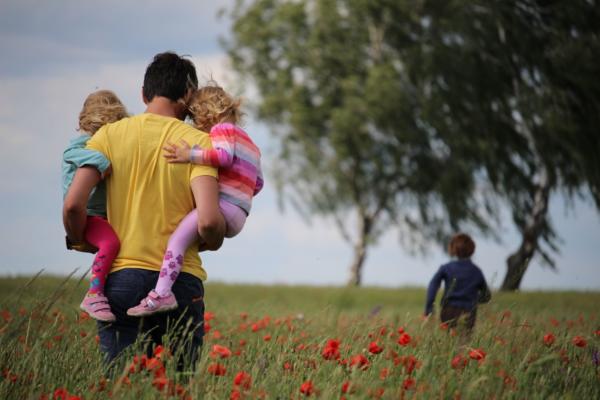Meeting anyone for the first time can be a bit awkward, and depending on the circumstances, it could also be exciting, nerve-wracking or even quite scary.
The period of ‘introductions’, when new adoptive parents or long-term foster carers first meet and get to know the child or children who will become a part of their family, encompasses and magnifies all of these already intense feelings – and probably many others.
Whether you are an adopter about to go through introductions, a foster carer who will need to facilitate introductions as children move on from your family, or a friend keen to support families who foster or adopt, we want to help you make sense of this process and offer some advice and encouragement. Even though introductions can be uncomfortable, challenging, exhausting and maybe just downright terrifying, and for foster carers they can also be painful and achingly sad, we hope they can also be full of joy as precious children are embraced by their forever families.
The practicalities
Once a child has been matched with their new parents or carers, and in the case of adoption this match has been approved by a panel of professionals, a social worker from the placing local authority will make the introductions plan. Most local authorities will have a template they work from, which social workers can then tailor for each child depending on their age, needs and experiences.
The purpose of introductions is to give the best possible foundation for new family relationships, and help the child or children feel as settled and secure as they can throughout the transition to their new home.
There are no rules as to how long introductions must be, but most will be scheduled to last around ten days to two weeks. In the case of babies and very young children, it may be shorter as it is often felt that a swift transition can be best with little ones. Some children may need longer or more gradual introductions, especially those with additional needs or those who are part of a sibling group that are not already familiar with one another.
Introductions will usually start with a short meeting in the child’s foster home, often of just an hour or so. In the subsequent days the time that new parents/carers spend with the child will increase, up to full days. Children’s foster carers will be heavily involved initially, sharing details of the child’s routines, needs, character and behaviour, and gradually the child’s care will transition across to the adoptive parents or long-term carers and foster carers will need to take a step back.
Approaching introductions as a new parent or carer
Congratulations! Whatever has led you to this point and however long your journey has been, this is a hugely significant moment for you and your family as you meet your child or children for the first time.
The myriad of emotions you will be feeling at this prospect is likely far too long and complex to list. One adopter shares her experience:
I tried so hard to liken it to something else, but there was just no comparison. I was about to meet my little boy, get to know him, and then bring him home forever – it was just the most extraordinary concept. It was surreal and scary and every insecurity I’ve ever experienced was fighting inside me: would I be good enough? What would he think of me? What would the foster carers and social workers think of me? It was hard, probably the most exhausting and demanding few days I’ve ever been through, but it was beyond worth it for the privilege of being my son’s mummy.
The intensity of introductions is likely to be quite gruelling, especially if you are having to travel far or stay away from home. Do whatever you can to prepare yourself for this by resting where possible in the days prior and in the early part of the process when you are only with your child for part of the day.
Take whatever help is offered to you and ask for help as much as you feel able. Could your friends or church provide you with some meals for your freezer? Could your family help you take care of pets? Could someone give your house a clean when you’re not there? If you have birth children or other children already in your care, consider where family or friends could help you with school runs or babysitting, or help you with practical things so you have more time to spend with your children.
You will likely be spending a lot of time with your child’s foster carers and much of it will be in their house – they will probably be as nervous about this as you are! Seek to communicate with them as best you can and make sure that plans are clear so everyone knows what’s going on. If you’ve been given a time to leave, make sure you do leave, as hard as that might be. They will need ‘down’ time as well, especially if they have other children in their care.
It is usually best not to make any specific promises to foster carers. As grateful as you may be and as well as you might get on, you don’t know how things are going to feel as you settle into your new family. It may be that you want to continue a relationship with your child’s foster carers and in many cases this can be an extremely positive thing, but don’t promise daily photos or weekly meet-ups or anything like that as it is an added pressure you don’t need – and if you do not deliver on your promises then the foster carers may experience another loss.
If you’re not sure about any aspect of the introductions plan, check with the social worker. If you feel there’s something in particular missing from the plans, ask about it. If you are concerned with how things are going, you begin to have serious doubts, or you have any issues at all, talk to your social worker.
Above all, try to enjoy this special time with your new family.
Approaching introductions as a foster carer
Whether you have cared for a child for weeks, months or even years, it will likely be a huge wrench to have to say goodbye. Even though it is ‘what you signed up for’ and ‘part of the job’, we recognise that this is an incredibly painful time for you and your family. And in the midst of all that emotion, you need to facilitate meetings, share everything you know about the child, have strangers in your home, and generally keep a smile on your face.
Introductions are really, really tough.
Make sure you have close friends or family members who you can talk and share openly with, and who will be praying for you. Ask for practical help where possible – with meals, cleaning, ironing, or helping with the other children in your care.
Be honest with your social worker and share any concerns that you have, especially if there are any aspects of the plan you are unsure about. You probably know the child better than anyone, so make sure that the plan fits well around their routine and will give the new parents/carers the best chance of getting to know them well.
Hopefully you will agree that the new parents/carers are a good match for the child, but even if you are unsure, do your best to share everything you possibly can with them. No piece of information is too small, and hopefully they will be keen to take every bit of advice you can offer. Do what you can to communicate clearly and don’t be afraid to repeat yourself about the important things – far better they hear something five times than not at all.
Obviously, if you have any concerns about the match or anything comes up throughout introductions, you should share this with your social worker.
Plan your own goodbyes where you can, and those of your friends and family who know the child well. Be intentional in this and do what you believe to be the best for the child – if someone they barely know from church wants to ‘pop in’ the day before they move, you will need to very firmly say no.
Give yourself space to grieve and let go. Hopefully you will also feel joy at seeing the formation of a new family, but it is absolutely understandable that the goodbye will be very painful. Be kind to yourself and the other children in your care, and take some time to rest after such a busy and emotional process.
Walking with friends through introductions
You can be a great support at this time in three ways: practically, emotionally, and prayerfully.
Consider what you can do to help your friends with food, in their home, or with other children they care for. You could coordinate a meal rota or offer to do some ironing or babysitting. Your friends might appreciate help with their garden or their pets. Offer whatever you are able to and whatever you can think of – and if they are the kind of people who might always say no, you can still drop in some food or a bunch of flowers so they know you are thinking of them.
Be available to listen and perhaps send occasional encouraging texts. It’s probably best not to ask lots of questions, but to make sure your friend knows you are there for them whenever they need to talk.
Pray for all involved and your friends most of all. Where appropriate, encourage others to pray to. Cover the whole period of introductions with as much prayer as possible!
The child at the heart of it all
Whatever way you are approaching the process of introductions, always remember that right at the centre is a child (or children) who is going through a huge transition – their whole world is changing, potentially for the second or third time (or sadly, perhaps even more than that). It may well be exhausting, painful, exciting, intimidating, scary, challenging and uncomfortable for you, and it is likely to be all these things and more for a child.
Introductions exist to make this huge change as smooth and as enjoyable as possible for each child, and as the adults surrounding this child, we must do whatever we can to make this so.
Home for Good wants to support you in every step of your journey. If you are facing the prospect of introductions as an adopter or foster carer you can call our enquiry line on 0300 001 0995. One of our team would love to chat and pray with you, whatever you’re feeling.











